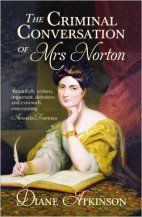The Criminal Conversation of Mrs Norton - Diane Atkinson

The Criminal Conversation of Mrs Norton - Diane Atkinson
Non-Fiction
Pages: 496
It's a shame that Caroline Norton is remembered mostly for the relationship with Lord Melbourne that resulted in the 'criminal conversation' trial of the title, because her life and legacy were both so much more than that. Whilst she was certainly what we would consider an accidental feminist, having no desire for or belief in the equality of women with men, she certainly fought against the injustice of the position of women in society, and several of the first 'feminist' pieces of legislation were passed due in no small part to her pamphleteering and political agitation.
Caroline Norton's life was defined by her husband, and it is that and not the 'crim con' trial that was the central feature of her life. It makes for hard reading - year after year after year Caroline's existence was curtailed and constrained by her husband's spite, cruelty, inconsistency, lack of honour or gentlemanly feeling, and hypocrisy. Caroline had literally no legal recourse - the law did not even recognise her legal existence outside of that of her husband. He could bar her from her home, refuse her a living allowance, deny her access to her children, slander her name, and there was nothing she could do. It is hard to judge whether George Norton was genuinely without conscience or compassion, or whether he was a weak man who was intimidated by his clever, beautiful wife and manipulated by his overbearing spiteful brother, but either way he utterly ruined Caroline's life when he married her.
And yet the greatest irony is that when George Norton and his elder brother Lord Grantley died, it was their connection to Caroline that was most remarked upon. She fought back, with any and all weapons she had at her disposal; she refused to go quietly or accept her husband's tyrannical behaviour. She was a poet and a novelist of great repute; a society beauty with many connections; a woman who won the public sympathy by refusing to suffer in silence.
There is much to admire in Caroline's life, and her story is well-told, for the most part. Diane Atkinson's sympathies are quite clearly nailed to the mast from the outset, and whilst it is a shame very little of George Norton's words have survived to tell his side of the story, it is hard to see how his behaviour could be spun in any positive light. My one criticism of this book is that it occasionally reads like a very educated academic author trying a bit too hard to write for the average reader. The tone for the most part is engaging and erudite without being pompous, but every so often colloquialisms or informal phrases or notes creep in that I found jarring when reading history and biography. It's a small criticism and one that sadly could easily have been solved in the editing process without detracting at all from the rest of the book.